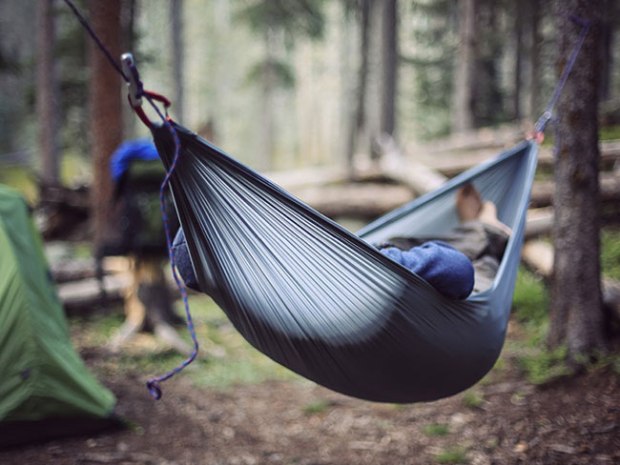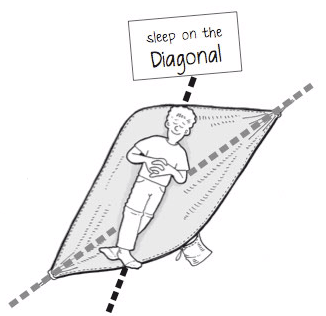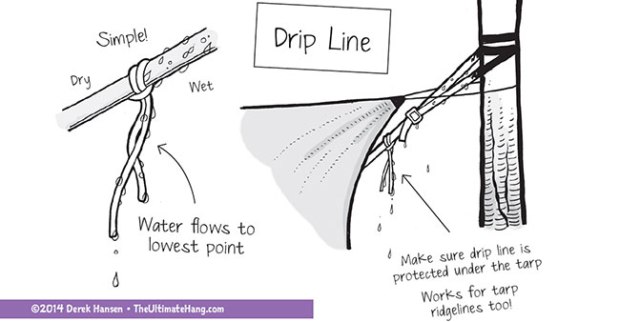8 Expert Tips for Comfortable Hammock Camping

Recreational hammocks are fast becoming “must-haves” for Scouting campouts, and many are small and light enough that folks bring them on day hikes, as well. Some of the primary reasons people like hammocks are because they are fun, comfortable to lounge in and pretty quick to set up. Whether you’re a veteran “hanger” or just starting out, here are eight tips to make the most of your hammock.
1. HANG YOUR HAMMOCK WITH A GOOD SAG
Too many people attempt to string up a hammock as tightly as possible between anchor points. This can cause a cocooning effect that can squeeze your shoulders and bow your back uncomfortably. Instead, try hanging your hammock with a good sag, as in a smiley face. If you really want to geek out, a good starting angle is 30-degrees from horizontal. This is the most important tip to make your hammock more comfortable. A deep sag also lowers the center of gravity, making the hammock more stable and harder to fall out of.
2. LAY DIAGONALLY ACROSS THE HAMMOCK

Once you’ve got a good sag (see tip No. 1), you can lay diagonally across the fabric. You’ll be amazed at how comfortable this will feel as your head and feet drop down and your body reclines ergonomically flat across the fabric. This is how hammocks were designed to work.
3. RAISE YOUR FOOT END HIGHER
In some cases, your body may naturally slide to the middle of your hammock, which can sometimes be uncomfortable. To prevent any sliding, try hanging the foot side of the hammock about 8 to 10 inches higher. This helps keep your heavier torso from sliding into the middle.
4. TRY A KNEE PILLOW
Depending on the size of your hammock (and how tall you are), you may feel a tight ridge under your legs when lying diagonally. This can cause hyper-extension on your knees. Ouch! To relieve this pressure, place some padding under your knees. Extra clothes or a small pillow would work great. (Remember: Longer, not wider, hammocks are generally more comfortable, allowing you to lie diagonally without leg hyperextension.)
5. USE A BUG NET
While some jungle hammocks come with sewn-on bug netting, simple recreational hammocks do not. No one enjoys bugs buzzing around your face, especially if those bugs bite. A full-length bug net can completely surround your hammock and create a roomy pod to read, rest and relax.
6. USE A SLEEPING PAD OR UNDER QUILT
A lot of folks think all you need is a sleeping bag to stay warm in a hammock. After all, you’re off the ground, so you don’t need a pad for comfort. What that pad does help with, however, is warmth. You’ll compress the sleeping bag insulation under your body in a hammock just like you would on the ground, so you’ll feel cold in a hammock without some uncompressed insulation beneath you. To keep the sleeping pad from slipping out from under you, try putting it inside your sleeping bag.
7. USE A DRIP LINE

On really rainy days, water can seep down your suspension and get your hammock wet. To prevent this, tie a drip line on your suspension, positioned under your tarp (you are using a tarp, right?). See illustration for more details.
8. FOLD YOUR HAMMOCK INTO A CHAIR
Sitting in a hammock can feel like a deep bucket seat. This can be comfy, but if you want a chair that doesn’t cut the circulation off your knees and lets you sit up squarely, take the edge of the fabric and fold it toward the center of the hammock. Sit down on this doubled-over area for a nice, flat seat.
Do you have other tips for maximizing the comfort in your hammock? Please share them in the comments below.
HAMMOCK SAFETY
Hammock camping can be a fun alternative to using a tent. Stay safe by following these safety guidelines, suggested by the BSA Health and Safety team:
- To prevent dangerous falls, hang your hammock no more than 3 feet off the ground.
- Do not hang your hammock over water features, chasms in the ground, or above tables or sharp objects.
- Do not participate in hammock stacking, in which multiple hammocks are stacked vertically.
- Just like a tent, do not keep food in your hammock.
Author Derek Hansen is an Arizona Scoutmaster and hammock-camping enthusiast who first used a hammock at age 14 at the BSA’s Beaver High Adventure Base in Utah. He’s the author of The Ultimate Hang: An Illustrated Guide To Hammock Camping (2011) and the website, The Ultimate Hang.
I have a grand trunk basic hammock for my gear, which is also comfy to sleep in that i got for 20 dollars, then i use the grand trunk extreme shelter that i got for 150 dollars which is great with a hennesey insulation pad during cold times. i bought all but the insulation at cabelas and the pad thru amazon for 25 bucks i think
check the regulation where you’re camping, “many” parks and camp ground prohibit hammock hanging, they literally spell out NO HAMMOCK attach to the tree. Whether they don’t know better or just not updated, you’re unlikely to win in argument. Prepare a backup tent just in case.
It would have been better to use a picture with of a hammock using tree-friendly straps.
Probably one of the most important points omitted: WIDOWMAKERS
And don’t hang your hammock from dead trees.
That’s a heart attack. What is it in hammock-speak?
The Eagle’s Nest Outfitters (ENO) hammock is a recreational hammock. If you’re looking for a camping hammock, Hennessy is the way to go, with built in insect screening and a rainfly
What type of hammock do you recommend?
Ron double nest I just got one from REI or cabellas for 79.00 it’s one of the best brands
I use a Warbonnet Blackbird XL. I’m a side sleeper and this one seems to be perfect for me.
Hennessy makes the “Scout Zip” that several boys in our troop got. You can usually find them online for under $100 and come complete with everything you need (suspension, tarp, and bug net).
Cool. I’ll have to try this.